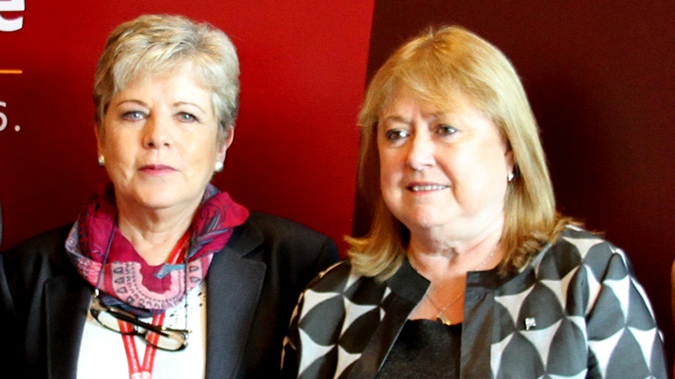Briefing note
Argentine Foreign Minister, Susana Malcorra, and the Executive Secretary of the Economic Commission for Latin America and the Caribbean, Alicia Bárcena, highlighted today the potential that the region has to implement and provide follow-up to the 2030 Agenda for Sustainable Development and its 17 goals, during a high-level session held in Mexico City.
Both authorities agreed that Latin America and the Caribbean is a region of peace and that the 2030 Agenda is a universal agenda that presents many challenges and offers enormous opportunities for promoting advances throughout society, in particular among women and young people, who should be at the center of policies if countries want to aspire to truly sustainable development.
“There is no other way to grow to be equal, and be equal to grow,” they indicated in the session on the regional dimension of follow-up to the 2030 Agenda for Sustainable Development, on the third day of ECLAC’s thirty-sixth session.
In a presentation before various countries’ permanent representatives to the UN, delegates of ECLAC’s member countries and secretary-generals of international organizations and regional integration bodies, Alicia Bárcena outlined the Commission’s proposals for accompanying implementation and follow-up of the 2030 Agenda.
These proposals can be summed up as integrating the Sustainable Development Goals (SDGs) in national development plans and budgets; strengthening statistical capacities for measuring the SDGs; and bolstering the regional architecture for integration. All of these actions will form part of the debates of the Forum of the Countries of Latin America and the Caribbean on Sustainable Development, which is expected to be approved during this current session and which will become a platform between the global and national levels to continue implementation of the 2030 Agenda and debate regional priorities, Bárcena explained.
In this Regional Forum, ECLAC’s subsidiary bodies, the countries of the region, the private sector and civil society will participate fully.
“The 2030 Agenda presents us with important implementation challenges, especially in terms of financing, technology, international trade, the building of statistical capacities and the promotion of open government. To face these we must focus on four core areas: equality, progressive structural change, the relationship between current circumstances and structures, and a new equation between the State, the market and the society,” Bárcena said.
Meanwhile, Argentine Foreign Minister, Susana Malcorra, underscored the region’s enormous resources for tackling the 2030 Agenda and indicated that it is necessary to put them into action so they respond to the needs of the people.
“The path ahead is extraordinary and multifaceted, and it integrates all levels, from our governments to citizens. Only by listening to them and considering their rights we will be able to make progress on the 2030 Agenda’s goals,” Malcorra said.
The Argentine minister also referred to South-South cooperation, which she described as important for generating more trade, investment and intraregional insertion in the world, with South-South promotion based in Latin America and the Caribbean.
In addition, the Vice President of the United Nations Economic and Social Council (ECOSOC), Héctor Palma, indicated that the 2030 Agenda forces us to rethink the current development pattern and insisted on the need for the system’s bodies to adapt their way of functioning to it.
Palma also referred to middle-income countries, a classification that includes 28 of the region’s 33 countries. “This category of middle-income countries is unfair, it does not encompass the great range of needs of nations, and some of them are even donors. These advances should be shared and strengthened,” he said.
During the session other speakers included the permanent representatives to the United Nations of Brazil, Antonio Patriota; of Peru, Gustavo Meza-Cuadra; of Jamaica, Sheila Sealy Monteith; and of México, Juan José Gómez Camacho. They highlighted the importance of the Forum of the Countries of Latin America and the Caribbean on Sustainable Development as a mechanism that will facilitate the implementation and follow-up of the 2030 Agenda in the region and will allow for communication among peers with other UN entities from other regions that were established for similar purposes.
The representatives also pointed to ECLAC’s work in this area. “From its beginnings, ECLAC has been a key actor for formulating policies, a role that has increased significantly since 2008 with the arrival of Alicia Bárcena to the Executive Secretariat. It is currently the most active and relevant of the UN’s regional commissions,” said Antonio Patriota, the Permanent Representative of Brazil to the United Nations.
Other participants in this meeting included secretary-generals of international organizations and regional directors of regional integration organizations and of the United Nations system, such as the International Labour Organization (ILO), the United Nations Population Fund (UNFPA), the United Nations Entity for Gender Equality and the Empowerment of Women (UN-Women), the Office of the High Commissioner for Human Rights (OHCHR), the United Nations Children’s Fund (UNICEF), and the Ibero-American Youth Organization (OIJ).
The complete program of ECLAC’s thirty-sixth session, as well as general information on the meeting, is available on the gathering’s special Web site: ://periododesesiones.cepal.org/36/en.
You can follow all the details of the meeting on social media using the hashtags #Horizontes2030 and #Horizons2030.
More information:
- Presentation by ECLAC’s Executive Secretary, Alicia Bárcena.
- Web site. Thirty-sixth session of ECLAC.
- Live transmission and videos of ECLAC’s thirty-sixth session.
For questions related to press coverage, contact:
María Luisa Díaz de León, Public Information Official, ECLAC’s Subregional Headquarters in Mexico. E-mail: marialuisa.diaz@cepal.org; Telephone: (52 55) 41705665. Cell Phone: (5255) 5416 9297.
Félix Ibáñez, Officer-in-Charge of ECLAC’s Public Information Unit. E-mail: prensa@cepal.org; Telephone: (56) 22210 2040. Cell Phone: (569) 7 967 8306.



